G20: emerging markets vs. advanced countries
Adelina Marini, November 1, 2010
 Several fronts are being opened on the eve of the summit of the twenty leading economies in the world (the G20) in Seoul. The first front divides the developed countries and the emerging markets. The main dispute among them is something which more and more economists call "currency wars" - the artificial support of national currencies, which some countries with especially fast and vigorous growth do. Such artificial suppression of exchange rates, according to most developed countries that insist the market should determine the value of currencies, leads to trade distortions and, therefore, to trade wars.
Several fronts are being opened on the eve of the summit of the twenty leading economies in the world (the G20) in Seoul. The first front divides the developed countries and the emerging markets. The main dispute among them is something which more and more economists call "currency wars" - the artificial support of national currencies, which some countries with especially fast and vigorous growth do. Such artificial suppression of exchange rates, according to most developed countries that insist the market should determine the value of currencies, leads to trade distortions and, therefore, to trade wars.
Within this group another frontline is opening - between the countries with trade surpluses and those with current account deficits. In fact, it would be correct to make another conditional division between these two groups - those with trade surpluses in general have a much better fiscal picture than those with deficits. The export countries are a mixture of developed nations (Germany) and emerging markets (China).
Global recovery but together, please!
A week ago the ministers of finance and the governors of the G20 central banks 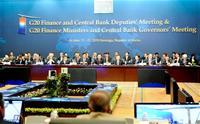 met in South Korea to try and hammer out a compromise agreement for the summit in November. The beginning of the communique outlines namely the first frontline: "The global economic recovery continues to advance, albeit in a fragile and uneven way. Growth has been strong in many emerging market economies, but the pace of activity remains modest in many advanced economies. Downside risks remain and are different from country to country and region to region. Yet, given the high interdependence among our countries in the global economic and financial system, uncoordinated responses will lead to worse outcomes for everyone", the first sentences in the communique read.
met in South Korea to try and hammer out a compromise agreement for the summit in November. The beginning of the communique outlines namely the first frontline: "The global economic recovery continues to advance, albeit in a fragile and uneven way. Growth has been strong in many emerging market economies, but the pace of activity remains modest in many advanced economies. Downside risks remain and are different from country to country and region to region. Yet, given the high interdependence among our countries in the global economic and financial system, uncoordinated responses will lead to worse outcomes for everyone", the first sentences in the communique read.
In general the ministers and governors had agreed for a coordinated approach in dealing with all global issues. But is this going to be realised in practice is hard to forecast yet, given the various needs of the economies that comprise the G20.
The US against everyone
The United States is the country that has the most serious problems because of its excessive indebtedness and unconvincing economic growth, accompanied by not quite flamboyant perspectives for improvement. Furthermore, mid-term elections are to be held soon in the country which put additional pressure on society and president Barack Obama's administration. The US is struggling vigorously against interventions in exchange rate policies, especially in China which holds huge currency reserves and is the main creditor of the American economy.
In a letter to his colleagues before the beginning of the meeting of the G20 finance ministers, the American Treasury secretary Tim Geithner outlines quite clearly the American interests by even giving proposals for measures: "First, G-20 countries should commit to undertake policies consistent with reducing external imbalances below a specified share of GDP over the next few years, recognizing that some exceptions may be required for countries that are structurally large exporters of raw materials. This means that G-20 countries running persistent deficits should boost national savings by adopting credible medium-term fiscal targets consistent with sustainable debt levels and by strengthening export performance".
Mr Geithner also recommends surplus countries to undertake structural, fiscal and exchange rate policies to boost domestic sources of growth and support global demand. "Since our current account balances depend on our own policy choices as well as on the policies pursued by other G-20 countries, these commitments require a cooperative effort", the American treasury secretary writes in his letter.
He makes another proposal - emerging market countries with significantly undervalued currencies and adequate precautionary reserves to allow their exchange rates to adjust fully over time to levels consistent with economic fundamentals. G20 advanced countries, on their behalf, should work to ensure against excessive volatility and disorderly movement in exchange rates. Besides Tim Geithner proposes the IMF to have a leading role in monitoring progress on commitments.
A large part of the recommendations in the letter have obviously been taken into account by the G20 finance ministers and central banks governors because their communique states: "Advanced economies, including those with reserve currencies, will be vigilant against excess volatility and disorderly movements in exchange rates. These actions will help mitigate the risk of excessive volatility in capital flows facing some emerging countries. Together, we will reinvigorate our efforts to promote a stable and well-functioning international monetary system and call on the IMF to deepen its work in these areas".
The EU - soft and heterogeneous
As always EU's position is soft and expresses the deep economic division within. In their conclusions from the European Council of October 28 and 29, EU leaders emphasize on financial regulation and, in particular, they insist for a full application by all G20 member states of the new Basel III rules. These rules refer most of all to the capital requirements for banks. "The European Union looks forward to the confirmation by the G20 summit of the Basel agreement, which is an important step in strengthening global financial stability", is written in the conclusions.
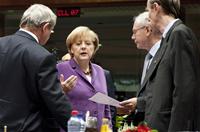 Only one sentence is dedicated to exchange rates and protectionism: "It [the Union] stresses the need to avoid all forms of protectionism and to avoid engaging in exchange-rate moves aimed at gaining short-term competitive advantages". A probable reason this issue to have received so small attention with such a soft wording could be that Germany is the country whose economic growth is due mostly to export. Besides, Germany is the economic motor of the eurozone. Berlin supported Beijing on the previous G20 summit on the position that countries with troubled finances are those that have to invest efforts to put their houses in order.
Only one sentence is dedicated to exchange rates and protectionism: "It [the Union] stresses the need to avoid all forms of protectionism and to avoid engaging in exchange-rate moves aimed at gaining short-term competitive advantages". A probable reason this issue to have received so small attention with such a soft wording could be that Germany is the country whose economic growth is due mostly to export. Besides, Germany is the economic motor of the eurozone. Berlin supported Beijing on the previous G20 summit on the position that countries with troubled finances are those that have to invest efforts to put their houses in order.
The second focus in the European Council conclusions for the G20 is levies and taxes on financial institutions. "Further work is necessary on levies and taxes on financial institutions, at both the international and internal levels. In line with the Council's report, there should be further coordination between the different levy schemes in place in order to avoid double-charging. The Council is invited to report back to the European Council in December 2010. The different options regarding the taxation of the financial sector should also be examined, as well as goo practices aimed at impeding tax heavens and tax evasion".
The European Union has for a long time been insisting on taxation of financial operations on a global level, not only locally, because otherwise this might lead to shifting of a large part of capital flows to countries that have no such regulation. The same position is being defended by the US too. Taxation of financial transactions, however, in general is a serious problem not only because of the existence of such measures in a number of countries, but also because of the underdeveloped financial markets both in the EU (the most part of the new member states) and in other developing countries or emerging markets. For example Bulgaria has already expressed its position against further taxation on the financial sector.
Most developed countries that were forced to pay with money from the budget (taxpayers' money) huge amounts to save the financial sector from bankruptcy, defend the position that the financial sector should take its share of the responsibility for the common stability.
Will there be enough for everyone?
One of the major issues which is unlikely to be solved at the Seoul summit is whether everyone would be able to achieve what they need the most, which is also the common ground for all members: economic recovery, sustainable economic growth, jobs creation, ensuring stability of global commodity prices. It is clear that all countries would benefit from achieving these goals. The question, however, still is - how, since each one of them has a different starting point. Nonetheless globalisation has reached its peak and there is no turning back. This is why it would be important this summit not to give a start of a global trade war.
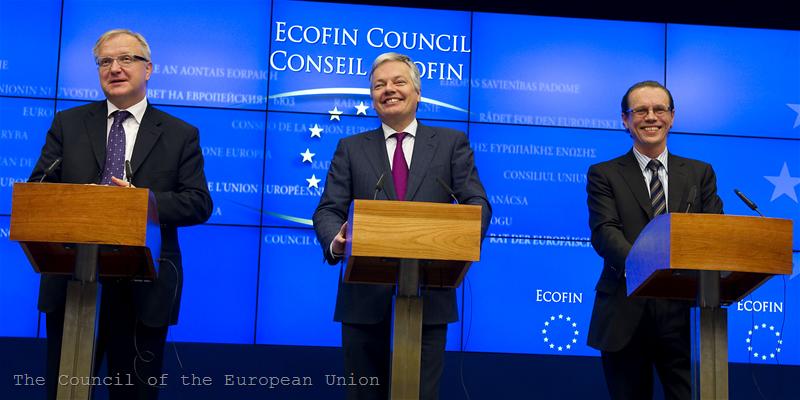 | © The Council of the European Union
| © The Council of the European Union | © European Council
| © European Council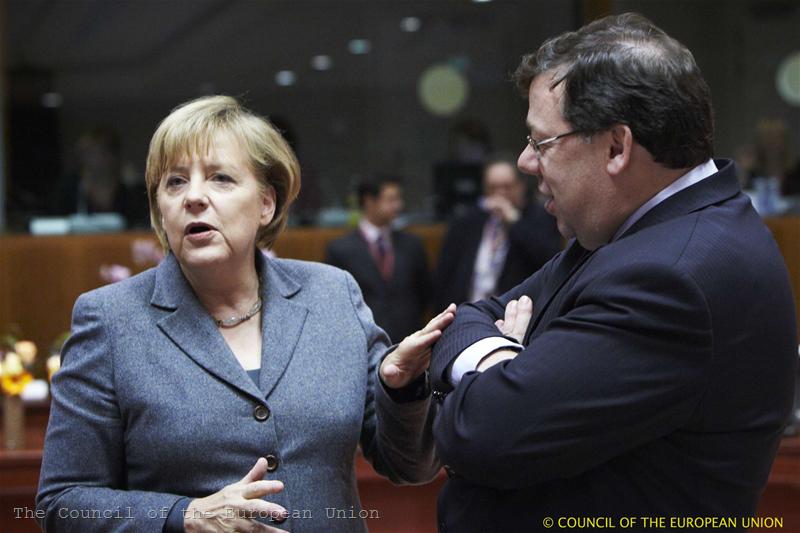 | © The Council of the European Union
| © The Council of the European Union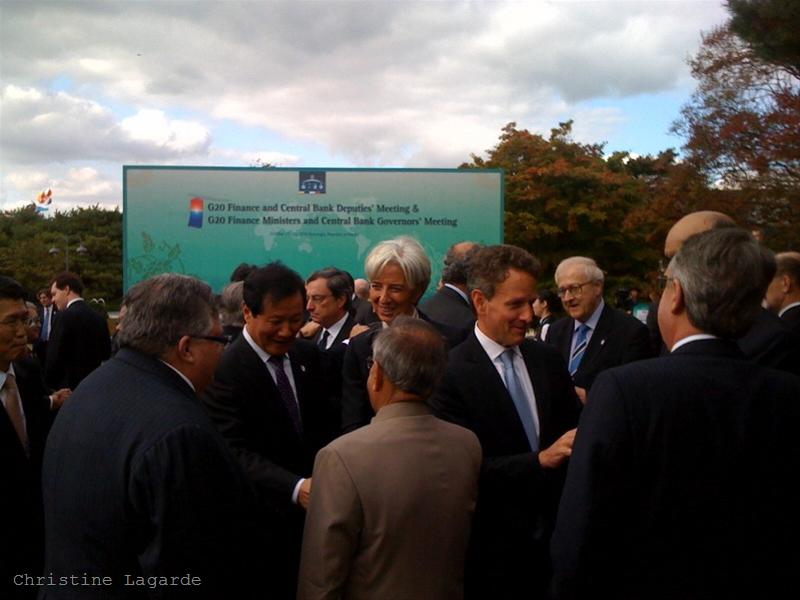 | © Christine Lagarde
| © Christine Lagarde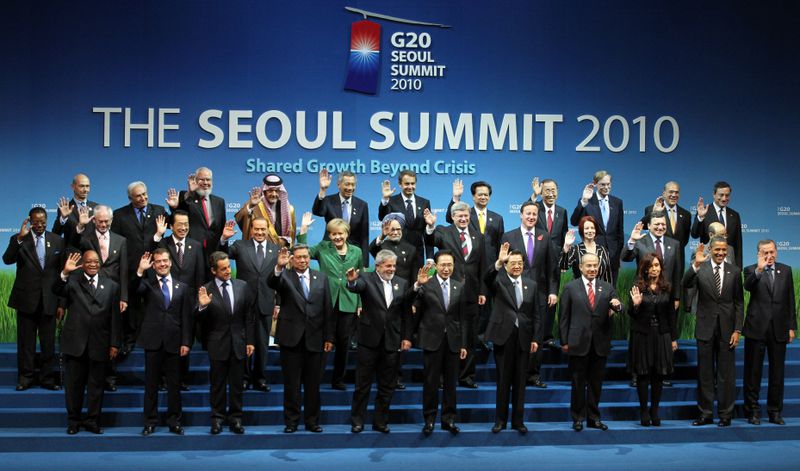 | © G20
| © G20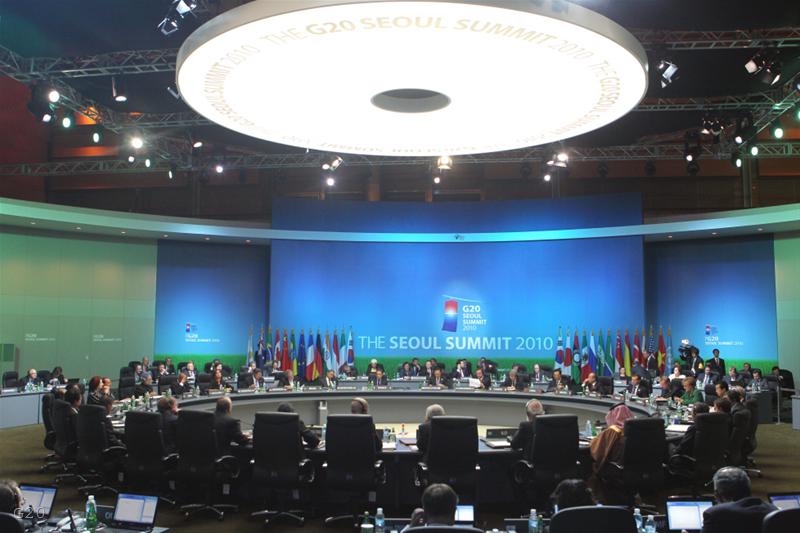 | © G20
| © G20